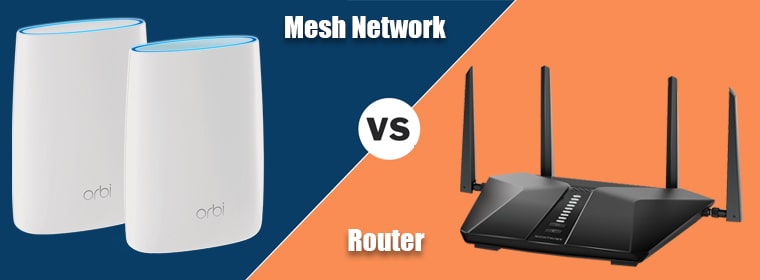
Traditional WiFi router or modern mesh system? This is the question that pops up in one’s mind while setting up WiFi in the home. A WiFi router acts as a centralized hub while the mesh network spreads the internet throughout the home. So, does that make the contemporary mesh network any better than the traditional WiFi router? Read this unbiased mesh network vs router guide and find the answer for yourself.
Routers have been there for ages and the mesh networks have been making their spaces in our homes for the past few years. In the race to get upgraded with the latest technology, most people are shifting from WiFi routers to the latest mesh systems. But if you’re perplexed and can’t decide which one suits your needs, then that won’t happen until you know the exact differences between them.
Here in this post, we have listed several factors that’ll help you get right to your decision. Read on.
A traditional WiFi router sits in one place creating a centralized WiFi access point. The router connects to a modem or DSL gateway. All the networking devices rely on a single device to get internet. The devices can connect using WiFi or by using an Ethernet cable.
If using a WiFi connection, as you move away from the router, the signal strength degrades. However, with the latest WiFi 6 and improved technology, the routers are getting better providing better coverage, lower latency and faster speeds.
A mesh network is decentralized and creates multiple WiFi access points. The main node, called a router, connects to the modem or DSL gateway while the other nodes get their input signals from the main node. The SSIDs for all the nodes are the same. These nodes upon connection are placed in various parts of the home.
Various devices in the home connect to the closest node. As you move in the home, the connection keeps shifting from one node to another without a signal drop.
A router can help you get WiFi coverage in smaller spaces. You can opt for a WiFi router if you live in a small space.
A WiFi mesh network can blanket larger areas with the internet. Netgear Orbi mesh system 970 series can help you cover up to 10,000 sq. ft.
When it comes to internet connectivity, faster speed is what people want to use for more bandwidth demanding tasks like online gaming, video calling, live streaming etc. A router’s internet speeds ideally depend upon its technology and specifications. The latest WiFi routers can help you get better speeds. However, the farther you move from the router, the speed gets affected too.
Mesh networks are built with leading-edge technology and hence help you meet your internet needs pretty well. Since you are connected to the nearest node, the speeds are always better for high bandwidth and live streaming. However, the distance between the nodes can affect the WiFi speeds. The issues can be resolved by relocation of the nodes.
We all want reliable WiFi coverage in all the parts of the home. A WiFi router has a limit to this. A router being the only access point, can provide you internet only in some parts of the home. Therefore router is ideal for smaller homes and areas.
Since you have multiple access points placed all over your home, the coverage area by the mesh network is much wider than a traditional router. If you want internet access in a multi storey building or a large home, then opt for a mesh network without thinking much about it. You can even widen the coverage by adding more nodes to the mesh network.
Setting up a WiFi router is very simple. You can complete the setup even if you are not that tech savvy. Most WiFi routers use a mobile app or web interface to set up and manage the network. For instance, Netgear routers use Nighthawk app for its setup and management.
A mesh network setup can be complex at times. However, even mesh networks use the app or web interface that helps you with all the required instructions for their setup. For instance, the Netgear Orbi mesh system can be easily set up by using the Orbi login details on the Orbi app or web browser via orbilogin.net.
The major factor that differentiates one device from another is cost. A traditional router is much more affordable than a mesh network.
Mesh networks on the other hand can cost you more. The more the number of nodes, the higher the price. But the kind of coverage and speed that you get won’t make you regret the amount you spend.
We have thoroughly discussed different factors in this post that are helpful in understanding the differences between the router and mesh network. We are anticipating that the guide on mesh network vs router has helped you decide which one suits you.
Disclaimer: We hereby disclaim ownership of any product and any association, affiliation or representation in any form, of any brand, product or service. All the information provided here has been drafted by a team of highly qualified technical experts and regularly undergo reviews and updates.